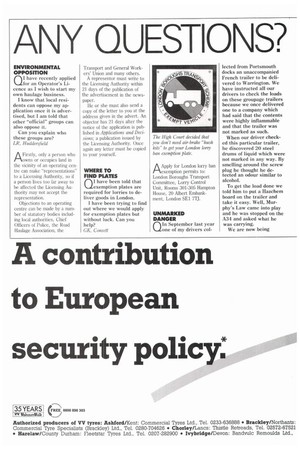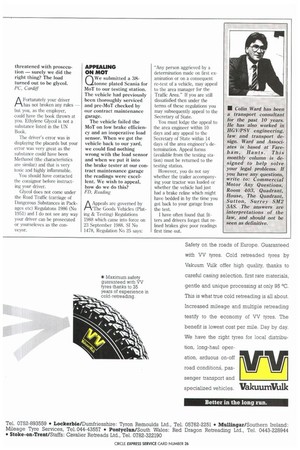ANY QUESTIONS?
Page 46

Page 47

If you've noticed an error in this article please click here to report it so we can fix it.
ENVIRONMENTAL OPPOSITION Qhave recently applied for an Operator's Licence as I wish to start my own haulage business.
I know that local residents can oppose my application once it is advertised, but I am told that other "official" groups can also oppose it.
Can you explain who these groups are?
LR, Huddersfield AFirstly, only a person who owns or occupies land in the vicinity of an operating centre can make "representations" to a Licensing Authority, so if a person lives too far away to be affected the Licensing Authority may not accept the representation.
Objections to an operating centre can be made by a number of statutory bodies including local authorities, Chief Officers of Police, the Road Haulage Association, the Transport and General Workers' Union and many others.
A representor must write to the Licensing Authority within 21 days of the publication of the advertisement in the newspaper.
He or she must also send a copy of the letter to you at the address given in the advert. An objector has 21 days after the notice of the application is published in Applications and Decisions; a publication issued by the Licensing Authority. Once again any letter must be copied to your yourself.
WHERE TO FIND PLATES QI have been told that exemption plates are required for lorries to deliver goods in London.
I have been trying to find out where we would apply for exemption plates but without luck. Can you help?
Consett AApply for London lorry ban ‘exemption permits to: London Boroughs Transport Committee, Lorry Control Unit, Rooms 301-305 Hampton House, 20 Albert Embankment, London SE1 7TJ.
UNMARKED DANGER QIn September last year one of my drivers col lected from Portsmouth docks an unaccompanied French trailer to be delivered to Warrington. We have instructed all our drivers to check the loads on these groupage trailers because we once delivered one to a company which had said that the contents were highly inflammable and that the trailer was not marked as such.
When our driver checked this particular trailer, he discovered 20 steel drums of liquid which were not marked in any way. By smelling around the screw plug he thought he detected an odour similar to alcohol.
To get the load done we told him to put a Hazchem board on the trailer and take it easy. Well, Murphy's Law came into play and he was stopped on the A34 and asked what he was carrying.
We are now being threatened with prosecution — surely we did the right thing? The load turned out to be glycol. PC, Cardiff AFortunately your driver has not broken any rules — but you, as the employer, could have the book thrown at you. Ethylene Glycol is not a substance listed in the UN Book.
The driver's error was in displaying the placards but your error was very great as the substance could have been Methanol (the characteristics are similar) and that is very toxic and highly inflammable.
You should have contacted the consignor before instructing your driver.
Glycol does not come under the Road Traffic (carriage of Dangerous Substances in Packages etc) Regulatons 1986 (No 1951) and I do not see any way your driver can be prosecuted or yourseleves as the conveyor. APPEALING ONMOT QWe submitted a 38tonne plated Scania for MoT to our testing station. The vehicle had previously been thoroughly serviced and pre-MoT checked by our contract maintenance garage.
The vehicle failed the MoT on low brake efficiency and an inoperative load sensor. When we got the vehicle back to our yard, we could find nothing wrong with the load sensor and when we put it into the brake tester at our contract maintenance garage the readings were excellent. We wish to appeal, how do we do this?
FD, Reading AAppeals are governed by The Goods Vehicles (Plating & Testing) Regulations 1988 which came into force on 13 September 1988_ SI No 1478, Regulation No 25 says:
"Any person aggrieved by a determination made on first examination or on a consequent re-test of a vehicle, may appeal to the area manager for the Traffic Area." If you are still dissatisfied then under the terms of these regulations you may subsequently appeal to the Secretary of State.
You must lodge the appeal to the area engineer within 10 days and any appeal to the Secretary of State within 14 days of the area engineer's determination. Appeal forms (available from the testing station) must be returned to the testing station.
However, you do not say whether the trailer accompanying your tractor was loaded or whether the vehicle had just had a brake reline which might have bedded in by the time you got back to your garage from the test.
I have often found that fitters and drivers forget that relined brakes give poor readings first time out.




































































































